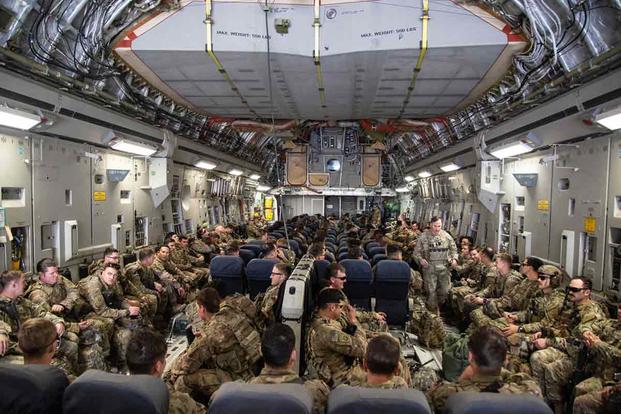U.S. troops stationed in the Middle East are temporarily banned from taking leave or liberty travel to other countries as the novel coronavirus continues to spread.
Capt. Bill Urban, U.S. Central Command spokesperson, said Thursday that the ban was recently put in place to prevent further transmission of the virus. Politico was first to report the change.
"U.S. Central Command is taking multiple prudent measures to prevent the transmission of COVID-19 Coronavirus and to mitigate the operational risk such transmission would pose," Urban said in a statement to Military.com "One of those steps is to suspend leave and liberty for U.S. service members within the Central Command area of responsibility."
The news comes as the U.S. Navy has implemented its own change for vessels operating in the Pacific. A service spokesman told multiple news outlets Thursday that ships operating in the 7th Fleet area of operations are under a 14-day self quarantine if the vessels recently made port in any country within the Asia-Pacific region. The quarantine will require the ships to remain out at sea, CNN reported.
Related: The Geopolitics of the Coronavirus
According to Stars and Stripes, of the Middle East countries where American troops are stationed, 43 coronavirus cases have been reported in Kuwait, "33 in Bahrain, 13 in the United Arab Emirates, six in Iraq, and one each Afghanistan and Egypt." The latest statistics were provided by the World Health Organization.
The majority of cases in the region are in Iran; no U.S. personnel are stationed there.
The virus has spread rapidly in recent weeks, with more than 80,000 cases diagnosed and at least 2,700 deaths across more than 40 countries, according to the World Health Organization.
WHO Director-General Tedros Adhanom Ghebreyesus said at a briefing Thursday that there are more than 3,474 cases in 44 countries outside of China, according to NPR. COVID-19 is believed to have originated in Wuhan in China's central Hubei province.
On Wednesday, US. Indo-Pacific Command announced that both military members and DoD civilians stationed in South Korea have been banned from nonessential travel. The ban followed news earlier this week that a U.S. soldier stationed at Camp Carroll in South Korea had tested positive for coronavirus, marking the first confirmed case of the disease in a U.S. service member.
Across other regions where U.S. troops reside, officials are bracing for an increase in cases and diagnoses.
"We're anticipating an increase in the number of cases reported in Germany," Air Force Gen. Tod Wolters said in response to questions from Arkansas Republican Sen. Tom Cotton during a Senate Armed Services Committee hearing Tuesday. Twenty-one cases had been confirmed in the country as of Wednesday, according to Deutsche Welle.
Wolters said military preparations are underway in the country, potentially putting thousands of troops on lockdown or restricted movement. In Italy, officials mandated base facility closures in Vicenza, where roughly 7,000 U.S. service members are stationed.
As of Wednesday, Italy had reported a total of 650 cases, NPR said, mostly in the northern parts of the country.
Meanwhile, the U.S. had 60 confirmed cases as of Wednesday.
At a House hearing Thursday, Dr. Robert Redfield, director of the Centers for Disease Control and Prevention (CDC), sought to reassure the public on efforts to contain the spread of the disease in the U.S. while announcing new guidelines to permit more testing by local clinicians for COVID-19.
Under previous federal guidelines, persons suspected of carrying the virus could be tested if they had traveled recently from China or had contact with an individual known to be infected.
The new rules published Thursday by the CDC allow local clinicians more leeway to order tests, even when a patient has shown no symptoms.
"We revised our case definition for persons under investigation and today that has been posted, along with a new health advisory," Redfield said at a hearing of the House Foreign Affairs Subcommittee on Asia, the Pacific and Nonproliferation.
"When a clinician or public health individual suspects coronavirus, then we should be able to get a test for coronavirus," he said.
Redfield repeated the estimates by the CDC and the White House that the risk of a major outbreak in the U.S. is low, and appeared to contradict the warning a day earlier by a top CDC official on the potential for its spread.
"We expect we will see community spread in this country," Dr. Nancy Messonnier, director of the CDC's National Center for Immunization and Respiratory Diseases, said in a CDC briefing Wednesday. "It's not so much a question of if this will happen anymore, but rather more a question of exactly when."
Redfield did not directly dispute Messonier but suggested she could have phrased her remarks differently.
"The risk of this infection remains low" in the U.S., he said, but more cases can be expected.
"We have an aggressive containment policy," he said, "[but] we do believe we're going to continue to see new cases."
-- Oriana Pawlyk can be reached at oriana.pawlyk@military.com. Follow her on Twitter at @Oriana0214.
-- Richard Sisk can be reached at richard.sisk@military.com.
Read more: Top Marine Orders Confederate Paraphernalia to Be Removed from All Bases













